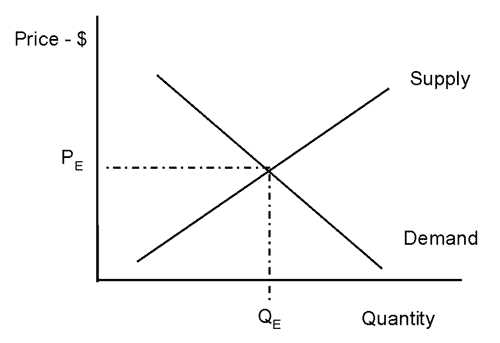The Conservative Nanny State
THIS COMMENT IS POSTED BY PROFESSOR MIKE MEEROPOL RECOMMENDING THE READING OF THE E-BOOK, THE CONSERVATIVE NANNY STATE, BY DEAN BAKER
In discussions among Economics students and faculty here at Western New England College we have often found ourselves arguing about the appropriate level of government intervention into the economy. The argument is often framed as “freedom” vs. “government intervention” where freedom involves the “natural” functioning of the market constrained only by competition subject to the “dollar votes “ of consumers and business firms as they offer to purchase factors of production or products.
Every Fall, Western New England College hosts a conference where people from the Foundation for Economic Education, a libertarian educational foundation, come to the college to debate the proposition that free markets with virtually no government intervention produce better results that all versions of market intervention from the modern welfare state to the centrally planned economies of the Soviet Union and its allies. These debates have been very fruitful and have carried over to many discussions both in class and on our Economics Club Manhattan Classroom.
I make this introduction because I am posting a link here to a new intervention into the argument. Economist Dean Baker from the Washington, DC based Center for Economic Policy Research has just published an e-book (that means it’s free on line) entitled THE CONSERVATIVE NANNY STATE. He argues that in the realm of reality rather than the theoretical role of our discussions, the arguments in favor of the “free market” vs. the “intrusive government” are not in fact what so-called conservatives are arguing about with so-called liberals. Instead, according to Baker, the conservatives want one kind of government intervention (one that favors those with property, high incomes and power) while the liberals (sometimes) favor another kind of government intervention (one that levels the playing field somewhat by curbing the power, high incomes and wealth of those who already have a lot of them). Baker argues that the modern conservative movement favors lots of government intervention – protection of copyrights and patents, even across international borders, freedom for high-income professionals from international competition, activities by the FED to make sure unemployment doesn’t get too low so wages don’t get too high, etc.
These chapters are quite provocative and quite readable. I recommend them highly.
In discussions among Economics students and faculty here at Western New England College we have often found ourselves arguing about the appropriate level of government intervention into the economy. The argument is often framed as “freedom” vs. “government intervention” where freedom involves the “natural” functioning of the market constrained only by competition subject to the “dollar votes “ of consumers and business firms as they offer to purchase factors of production or products.
Every Fall, Western New England College hosts a conference where people from the Foundation for Economic Education, a libertarian educational foundation, come to the college to debate the proposition that free markets with virtually no government intervention produce better results that all versions of market intervention from the modern welfare state to the centrally planned economies of the Soviet Union and its allies. These debates have been very fruitful and have carried over to many discussions both in class and on our Economics Club Manhattan Classroom.
I make this introduction because I am posting a link here to a new intervention into the argument. Economist Dean Baker from the Washington, DC based Center for Economic Policy Research has just published an e-book (that means it’s free on line) entitled THE CONSERVATIVE NANNY STATE. He argues that in the realm of reality rather than the theoretical role of our discussions, the arguments in favor of the “free market” vs. the “intrusive government” are not in fact what so-called conservatives are arguing about with so-called liberals. Instead, according to Baker, the conservatives want one kind of government intervention (one that favors those with property, high incomes and power) while the liberals (sometimes) favor another kind of government intervention (one that levels the playing field somewhat by curbing the power, high incomes and wealth of those who already have a lot of them). Baker argues that the modern conservative movement favors lots of government intervention – protection of copyrights and patents, even across international borders, freedom for high-income professionals from international competition, activities by the FED to make sure unemployment doesn’t get too low so wages don’t get too high, etc.
These chapters are quite provocative and quite readable. I recommend them highly.


0 Comments:
Post a Comment
<< Home